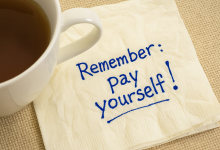Salary Sacrifice: Why Founders Should Always Pay Themselves

“Paying yourself isn’t selfish, it’s sustainable. The goal is to strike a balance that supports your personal life without compromising the growth of your company.” (Salim Omar, CPA and serial entrepreneur)
Many founders see skipping their own salary as a noble way to fund growth. In reality, underpaying yourself often backfires. Research shows that 82% of small business failures stem from cash flow problems and unpaid founders can mask true costs, distort margins, and create hidden financial pressure – and that’s just the start of it.
What’s the real cost of your time?
When founders refuse to take a salary, they are effectively treating their own time as free. In the scramble to conserve cash, they tell themselves they can wait to be paid until profits improve. But unpaid labour is not free. By not recognising this cost, you skew the economics of your business.
Imagine you hire a manager to take over your duties. Their salary would immediately appear as a line item. By not paying yourself, you are masking a true expense. This can mislead investors, lenders, and even yourself about whether the business model is sustainable and prevent changes that need to be made. Pricing, margins, and growth targets all look healthier than they are, setting you up for shocks later.
This is why savvy investors prefer to see founders compensated fairly. An unpaid or underpaid founder may seem admirable in the short term, but it raises questions about whether they and the company can endure the demands of growth.
Burnout is real
Founders who delay setting a salary usually do so because they are waiting for a day when they feel the business has “earned it.” The problem is that this line keeps moving. There’s always another milestone, another round of investment, or another expense that feels more urgent. Meanwhile the founder is likely eroding personal savings, undermining their career advancement elsewhere and causing stress and sleepless nights in their own home.
A survey by Kruze Consulting of over 200 venture-backed start-ups found that business owners who underpaid themselves for too long often burned out and quit before their companies reached key milestones. By paying yourself out, and minimising the financial risks at home, you can avoid the same fate.
Tax benefits
Not paying yourself a salary isn’t doing the company as many favours as you expect. All expenses put through the company (including salaries) reduce your company’s tax burden, meaning that the benefit you’re providing the company by not taking a salary is significantly smaller than you think.
As a general rule, it’s advised that you take 50% or less of the business’ net profits as compensation and save the rest for reinvestment, but each company is different. As your accountants, we can help you to structure the salary you pay yourself to ensure that the greatest benefit is achieved for all concerned – thereby lessening any guilt you may feel for taking a salary before the business is “ready”.
The effect on morale
One of the more surprising aspects of not paying yourself a salary is the impact it has on staff morale. Salaries are a hot topic in any business, and the founder’s salary is carefully watched by all who work there. Paying too much to the CEO or founder can lead to resentment, with staff feeling that difficulties on the floor are not shared in the board or that the effort at lower levels is not being adequately compensated.
Likewise, founders who take no salary, or a significantly reduced salary, instil distrust and fear among employees who begin to suspect that the company is struggling and likely to go under. This can lead to job-security worries, lower job satisfaction, increases in absenteeism, quiet quitting and higher than normal staff turnover – all of which will impact the business’ bottom line.
Paying yourself is paying your business
Refusing to take a salary may feel like dedication, but over time it will eat away at both you and your company. Underpaying yourself masks the true cost of operations, distorts financial planning models, breaks employee morale and increases the risk of burnout. Setting a realistic salary is not selfish, it is a structural choice that strengthens transparency, stability, and resilience.
Let data guide the choice. Track your revenue, costs, and cash flow. And compare your compensation to industry benchmarks for founders at similar stages.
Businesses survive when their leaders are healthy, focused, and honest about costs. By recognising your worth and paying yourself accordingly, you are not taking from the business, you are ensuring it has a solid foundation on which to grow.
